TV Shows, Filmmakers Prepare to Fill the Content Pipeline
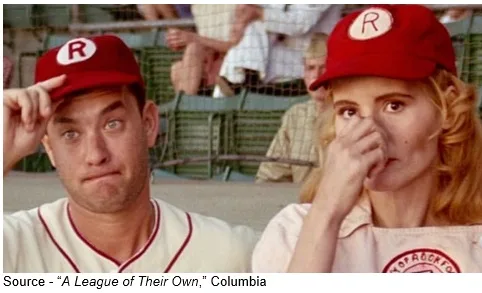
We’re beginning to wonder if there’s something about the human psyche that makes people not to want to be alone with themselves.
To make the pandemic tolerable for folks, someone came up with an empathetic phrase, “Alone Together.”
It’s not bad enough that you have to spend half of your business day on Zoom calls; but then you move from the home office to the couch to watch a bunch of Zoomers watch someone else Zoom and call it … entertainment.
If that’s not bad enough, you “switch” to YouTube to watch shorts of kids/adults acting up and waiting for their big break when a director or agent “discovers” their talent.
All the while, you’re ready to bolt with one foot out the door just waiting for someone/anyone to give everyone the all clear just so you can go out for dinner, dash to your favorite bar or race to the theater to watch something new/different on the big screen.
It’s a glimmer of hope for normalcy to get your life back, even though it will still be abnormal.
After all, the advertising upfronts in NYC were so bleak this past spring that they left a vacuum of uncertainty — content owners and advertisers didn’t have a clue as to what would be on this fall … or when.
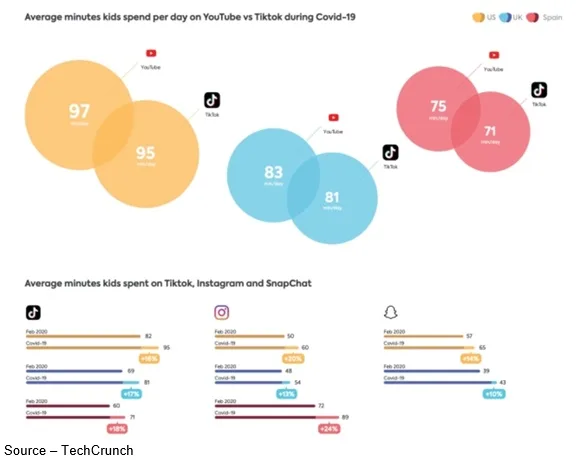
The opportunity was so big that social video folks couldn’t resist offering up a marketing alternative and held their own NewsFronts.
We have nothing against social media video, we just don’t watch much because most is below amateurish.
However, it does provide M&E aspirants and seasoned pros an opportunity to show their creativity to “others.”
It’s also a great place for show trailers and outtakes of shows to capture new viewers and build audience interest.
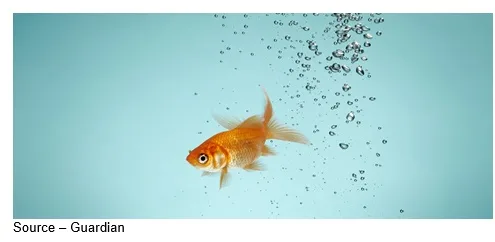
Despite the fact that Martin Scorsese, Spike Lee, Lulu Wang, Marielle Heller, Quentin Tarantino and Greta Gerwin as well as other directors and creative teams around the globe work hard to produce outstanding two-hour visual stories, Microsoft and others report that people’s attention span has dropped to eight seconds … less than a goldfish!
Social video folks’ sales pitches were straight, to the point.

YouTube:
- 2B + users every month
- 1B hrs. of video watched every day
- 70 percent on mobile devices
- Reach more folks 18-45 than all pay TV combined (Nielsen)
- 100M+ people in US watch YouTube, YouTube TV on TV screens each month
- YouTube TV has 2M subscribers, 100 channels
- YouTube already makes up 41 percent of ad-supported video streaming watch time
In other words, YouTube is the place to go if you want to watch almost anything, everything.
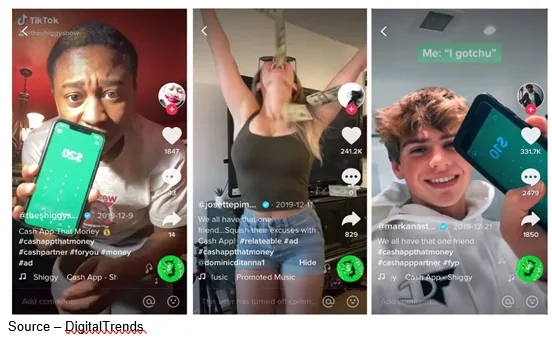
TikTok:
- 4.7M video views/min, 1B every day
- 800M active users
- 1.5B app downloads
- 41 percent of users are 16-24
- users spend 52 min day on the app
- videos can be 15-60 seconds
– tapped Kevin Meyer, former head of Disney D2C, as CEO
There’s also Instagram, Snapchat and a myriad of other social media video opportunities around the globe for pro creatives and wanna bes to get video stories seen and monetized.
“Due to the efficiencies of commercial insertions, there are way too many situations where really great programming along with marketing messages are inaccurately saddled up to disturbing, grossly manipulated or just plain ridiculous content,” said Allan McLennan, Chief Executive, Padem Media Group.
With the 2020 Olympics moved to next year and every sporting event shut down for months, it’s understandable why pay TV networks were desperate for some good news. Without baseball, basketball, football, soccer, lacrosse, rugby, racing, golf on the screen; our brother-in-law (and millions of other fans) said there was nothing on TV.
Game, race and event highlights from years past just didn’t cut it.
Finally, training camps have opened and abbreviated schedules have been announced with dramatically revised rules.
The stands? Eerily quiet.
It was like the sports enthusiasts had been given a giant pacifier … it was okay, it would tide them over; but it just wasn’t the real thing.
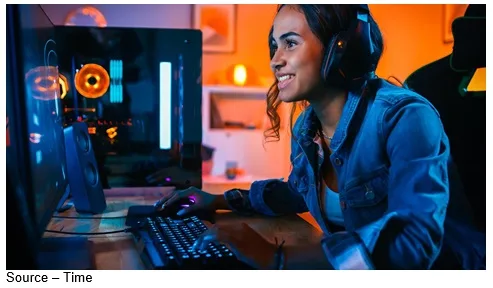
The brother-in-law was so desperate that even watching eSports with his kids watching other kids play video games was … satisfying.
It turns out eSports is well on its way to becoming a $1B M&E segment right before our eyes.
But to really mark the return to M&E “normalcy” for many, the movie theatre had to be open and running the best, most expensive/eye-popping films studios and video creative teams could serve up.
Cinemark, AMC and other movie theater owners bravely (and cautiously) opened for theatergoers with new attendance guidelines and extended premiere periods to ensure they could get an “available” seat keeping social distancing in mind.
Broadway, however, erred on the side of caution — the lights will remain dark until 2021.
Films are cool but there’s nothing like sitting in a theater with hundreds of strangers sharing a moment of surprise – person with person – as the drama unfolds before your eyes.
But Broadway/Hollywood said the shared live experience has been placed on hold or reduced until everyone can feel safe and really enjoy it without wondering … if.
Some movie producers had the “muscle” to insist on theatre viewings but a lot of outstanding projects went directly to streaming, racking up exceptional audience numbers and sales.
When every filmmaker started out, theatrical releases were important.
Today, with global streaming services, many question if the global theatrical business model can no longer scale. Especially as relationships and regional options of D2C have begun to increase in size, delivery and audience engagement strength.
While services like Netflix, Disney, Amazon, Apple haven’t had to introduce themselves to European and APAC consumers; others including Vudu, Pluto and Tubi (all AVOD services) have to market/introduce themselves, reach regional agreements and promote themselves as great alternatives to folks everywhere.
Regional European services have lobbied for – and received – regulations on large US players including strict content release windows and funding contributions for local production which have leveled the opportunities for local services.
“The EU streamers are starting to really gain traction, both in their programing and reach,” McLennan noted. “They are beginning to and will continue to benefit from a rapidly expanding streaming market.”
The market will experience double-digit growth over the next few years with total Western Europe SVOD revenues hitting $9.5B this year, double that of last year.
Eastern and Western Europe will add more than 54M subscribers over the next five years; and as with US consumers, will be stacking services onto their present Netflix, Amazon, Disney services.
“The tide raises all boats,” McLennan noted.
McLennan added, “The key for these services is to not just offer a service, it’s in providing tremendous value in their pricing, great content, a smart user interface and marketing it right. It won’t simply fall into their laps. They’ll need exactly the right balance.”
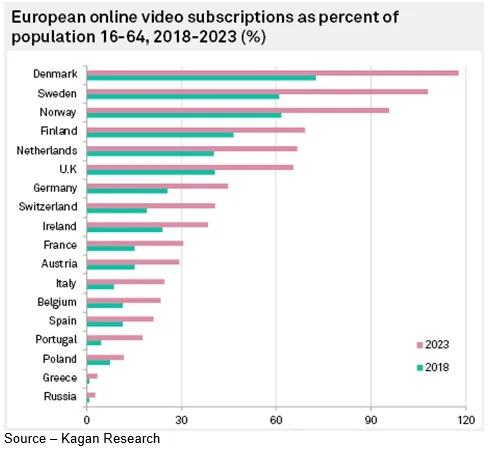
European TV networks are typically regional in nature. For example, the Nordics, who are at least a decade ahead of the rest of the world, have learned how to leverage subtle cultural and language differences to enhance their logistical details, efforts and costs.
A regionalized approach is also necessary in the Asia/Pacific (APAC) market.
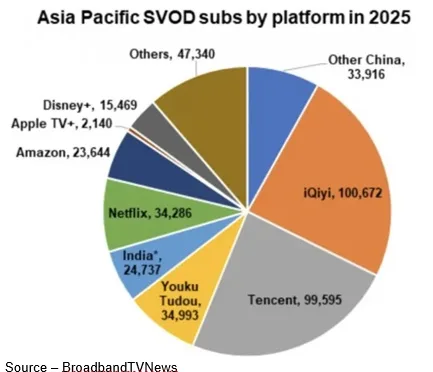
Because of severe governmental restrictions, iQiyi/Bidui, Tencent and Youku Tudou have the world’s second largest content viewing market almost to themselves.
However, there are signs that relationships may be challenged now with services like Disney, Amazon and Apple that already have deep relationships in those regions which will help open the viewing market.
India’s video subscription market is projected to reach 500M by 2023, surpassing the US market and making it second only to China.
Thanks to owning India’s Hotstar, Disney + instantly became India’s largest streaming service with more than 1M hours of drama and movies in 17 languages and coverage of every major genre including live cricket and soccer.
More than 300M mobile viewing subscribers have access to all Hotstar and Disney + content as well as HBO, Fox, Showtime and the latest Hindi and regional movies … a helluva’ deal.
The growing use of the country’s digital infrastructure and an enhanced Internet are rapidly making India a major target for the OTT industry.
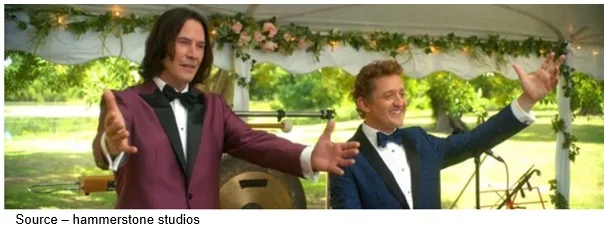
While lots of producers (and every exhibition owner) are hungry for content to throw on their screens, we’re more in tune with the growing streaming audience.
We’ll wait for Wonder Woman 1984, No Time to Die, Top Gun: Maverick and the others to stream on one of our services.
We have plenty of streaming options and while VOD services are short on new shows/movies right now, there are still huge libraries of “yet to see” content.
Our only concern is how quickly/safely the creative/production crews – folks who really do the work – will be back on the set.
TV show and movie production crews went from a full calendar of projects at the beginning of the year but by the end of the first quarter, things were blank and bleak.
When studios around the globe shut down production, the contract work and paychecks disappeared.
“I’m taking it day-by-day,” a Toronto-based DIT (digital imaging tech) who asked not to be identified said early this month. “We’ve been around long enough to know how the industry works, so we have a financial reserve set aside; but still, it’s a psychological struggle.
“We have to/want to get back on the set, but it’s going to be … different,” he noted. “Fewer people, new responsibilities/duties and all of the new guidelines set up by the government, studios, industry/trade associations and they really don’t know what’s going to work or what is going to shut us down … again.”
“We don’t know what we don’t know,” a UK-based shooter said during a video call. “We need as much information – even if it’s rough info – and data as we can possibly get. Sure, some folks claim we’re overwhelmed with data, but they’re not onsite doing the work.
“We’ve never been in this position before and we have to take it in a laissez faire fashion,” he added. “If it works, we say, ‘See, told you so.’ If it doesn’t work, we say, “See, told you so.
“Or … we simply sit this one out and there’s no fun in that,” he concluded.
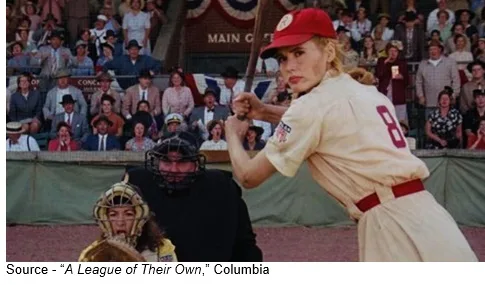 He has the same attitude as Jimmy Dugan had in A League of Their Own when he said, “It’s supposed to be hard. If it wasn’t hard, everyone would do it. The hard… is what makes it great.”
He has the same attitude as Jimmy Dugan had in A League of Their Own when he said, “It’s supposed to be hard. If it wasn’t hard, everyone would do it. The hard… is what makes it great.”
# # #
Andy Marken – [email protected] – is an author of more than 600 articles on management, marketing, communications and industry trends in media & entertainment, as well as consumer electronics, software and applications. An internationally recognized marketing/communications consultant with a broad range of technical and industry expertise in storage, storage management and film/video production fields; he has an extended range of relationships with business, industry trade press, online media and industry analysts/consultants.